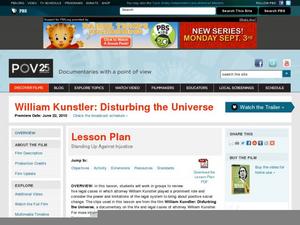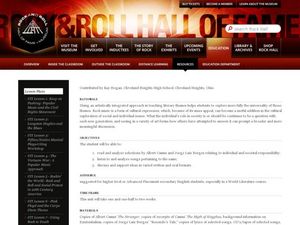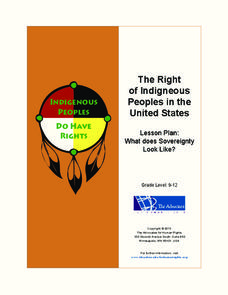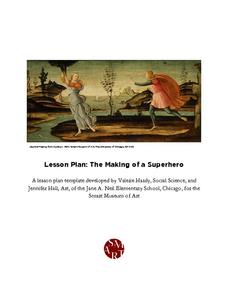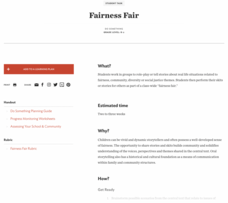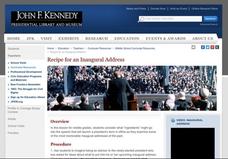Curated OER
Artist Unknown
Pupils read a six-paragraph selection titled, "Artist Unknown." Then they respond to six multi-step questions regarding the arts. I would use this to supplement my existing curriculum.
Curated OER
Inuit Sculpture
Kids in grade four through eight research Inuit artists and art styles. After a critical look at Inuit sculpture, they use those forms for inspiration as they create one of their own. They practice using the subtractive method of...
Curated OER
Theatre Lesson Plan- Tableau (part 2)
Students explore tableaux. In this social studies and fine arts cross curriculum lesson, students work in groups of four to create "frozen" stage pictures (tableaux) representing vocabulary and concepts from a "From Farm to You" social...
Curated OER
Life for the First Inhabitants
Fourth graders trace the emergence and development of culture in Utah. They study the contributions of the American Indian culture on the development of Utah. They create their own rock art by using signs and images that show something...
Film Foundation
Mr. Smith Goes to Washington: What Is a Movie?
Watching is not the same as seeing. Transform viewers from passive watchers to active students of film with this 34-page packet, filled with lessons and activities that use Mr. Smith Goes to Washington to examine the technology, the...
Mary Pope Osborne, Classroom Adventures Program
Mummies in the Morning Egyptian pyramids, hieroglyphics
Visit the Magic Treehouse and take your class on a trip through time with a reading of the children's book Mummies in the Morning. Using the story to spark an investigation into Egyptian culture, this literature unit engages...
PBS
Standing Up Against Injustice
“Sometimes things are lawful yet are actually wrong.” Researchers examine primary and secondary source materials as they study five legal cases involving civil rights attorney William Kunstler in which he attempted to use the legal...
US Department of Education
A Close Reading of Lincoln’s Gettysburg Address
Abraham Lincoln's Gettysburg Address provides the text for a series of close reading exercises that model for instructors how carefully crafted guiding questions can help readers think critically about what they read, thus developing...
Curated OER
Online Collaborative Social Studies Lesson Plan
Students create newspapers and post them online for others to see.
Curated OER
Kool Kumara Lesson Plans
Students examine the Kaipara region of New Zealand and practice research and writing skills. In this social studies activity, students use a template to create their own Kool Kumara Pal. Students explore a day in the life of their...
Curated OER
Individual vs. Social Responsibility: From Camus to the Cure
Students explore the individual's role in society. In this social responsibility lesson, students analyze Camus's The Stranger and The Myth of Sisyphus as well as Borges's "Rosendo's Tale." Students compare the themes of the pieces to...
Advocates for Human Rights
The Right of Indigneous Peoples in the United States
The sovereignty of U.S. Native American nations is the focus of a resource that asks class members to compare the Right to Self-Determination in the UN Declaration on the Rights of Indigenous Peoples with a fact sheet that details the...
NET Foundation for Television
1850-1874 Notable Nebraskan: J. Sterling Morton
What are the characteristics of an outstanding citizen? Nebraskan J. Sterling Morton contributed to the formation of societal and family values in his state. Learners gather information on Morton's life accomplishments from primary...
Smart Museum of Art
The Making of a Superhero
Thor, Loki, Iron Man, and Captain America. As part of their study of Greek and Roman gods and heroes, middle schoolers compare the characters in The Avengers to Greek counterparts. Individuals then create their own superhero, describe...
NET Foundation for Television
1850-1874 Native Americans and Settlers
Did Western settlers receiving free land from the Homestead Act realize it wasn't really free at all? Scholars investigate the impact Western expansion had on Native American culture in the mid-1800s. They use documents, timelines, and...
University of Chicago
Comparing Modern and Ancient Ideas of Ethnicity and Identity
Explore ethnicity and identity with a research and writing assignment. Class members conduct online research, looking in particular at images and carefully noting down their sources on notecards. They read about identity and compose...
Alabama Department of Archives and History
Alabama Farm Life in the Great Depression
The Great Depression not only impacted city folk and factory workers, it also had a profound effect on farmers. Young historians examine primary source materials that document the struggles of Alabama farmers during this time and then...
Library of Congress
The Emancipation Proclamation and the Thirteenth Amendment
How did the Emancipation Proclamation lead to the Thirteenth Amendment? Middle schoolers analyze primary source documents including the text of the Emancipation Proclamation, political cartoons, photographs, and prints to understand the...
NET Foundation for Television
1850-1874 African American Settlers
Go West, young man! Scholars investigate the impact of African American settlers moving to the Nebraska territory, following the passage of the Kansas-Nebraska Act in the mid 1800s. Using primary sources, timelines, maps, and...
NET Foundation for Television
1850-1874 Homestead Act Signed: Who were the Settlers?
Life in the great, wide-open spaces of the West! Scholars analyze the reasons behind the vast movement to the Great Plains after the passing of the Kansas-Nebraska Act and the Homestead Act. Using photographic, document, map, video, and...
NET Foundation for Television
1850-1874 Homestead Act Signed: The Challenges of The Plains
Start a whole new life in a land known as the Wild Wild West! Learners analyze maps, personal accounts, the Kansas-Nebraska Act, songs, and video clips to uncover life under the Homestead Act. Using their new skills, class members role...
Teaching Tolerance
Fairness Fair
How can we create a more fair world? Chances are, class members have some ideas! After reading a text about fairness, individuals create skits around the ideas of fairness. Extend the learning and make their presentations a...
John F. Kennedy Presidential Library & Museum
Recipe for an Inaugural Address
An inaugural address represents the first moments of a new beginning. Using John F. Kennedy's speech as a model for guided practice, groups examine the ingredients of an inaugural address. Individuals then repeat the analysis process...
Scholastic
Mindful Listening
Teach your middle schoolers to use their ears to their highest potential! Pupils practice active listening skills and reflect on how careful listening might prove to be important in and out of the classroom.








